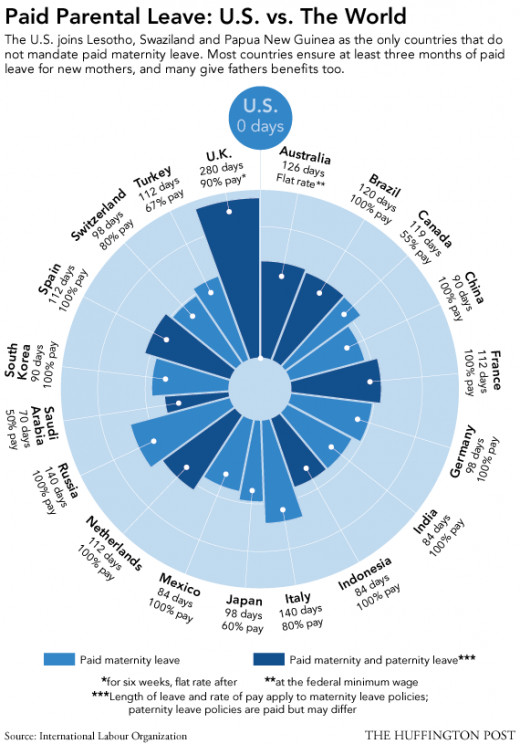5 Assumptions Made About Women and Why They're Wrong
Gender normative behaviors cannot be dated precisely, but they've been around for thousands of years. They're all over the world, from footbinding in 10th Century China, to arranged Marriages in India to before Medieval Europe when women were handed off for an 'exchange', or 'dowry'.
Why?
Anthropologists can tell you that our early ancestors dating from Cro Magnon all the way to at least Homo Habilis there were divisions of labor. It's possible that early cultures that developed during that time capitalized on these differences. Especially when they didn't know where their next meal would be coming, hence our terrible genetic disposition to prefer things that are fatty and sweet, and they weren't sure if they would be able to get on to the next day without being eaten.
However, our species has come a long way since then, as has our culture, which is becoming more global and more connected than ever. As have our women, who deserve better than to live by the outdated substandards that place them below their fellow humans; men. Major countries such as Germany down to developing nations like Liberia have elected female leaders. Women have been collecting acting awards alongside their male counterparts. Paid maternity leave is mandatory in over 19 countries (but not the United States). These are 5 assumptions many people still hold over women; 5 reasons why we're not there yet.

1.) Women Are More Nurturing Than Men
I've heard this argument made before, and many people point to the animal kingdom for evidence. "The male lions in the pride fight, while the women take care of the children and fetch the food. It's just nature," or "chimps are our ancestors, right? Their males go hunt and protect the group while females take care of babies and look for food." What they often don't bring up is that in the same animal kingdom are exceptions. Bees are an entirely matriarchal structure where the female bees are the soldiers, workers and caretakers, and the males exist solely to procreate.Or how about the fact that Bonobos, which are a relative to the chimpanzee (which, by the way, is NOT our ancestor, but our closest genetic relation) work in a matriarchal structure where the female makes threat displays to ensure her dominance just as much as the males, as well as engaging in coitus to establish superiority. The "nature" argument for why women are more "docile" or "nurturing" doesn't work.
Bambi Turner, writer for Curiosity.com covered by The Discovery Channel explored this concept. She concluded that the entire idea of women being any more nurturing than men has no genetic basis and that it's an entire social construct. Her evidence is collected from different fields. Sociologists in her correspondence say that these norms are likely created to perpetuate "the male-dominated status quo", while Anthropologists study diverse cultures and conclude that there are in fact no universal gender roles; that there is enough culture variation to disprove the 'nature' theory. What's more, is that Turner describes the University of Michigan's study where both men and women were asked this question, and men were more likely to respond that women were genetically predisposed to be more nurturing. But both men and women were equally inclined to agree that math skills, spacial awareness and violent behavior are reliant upon genetics. It's postulated this is because men would be "relieved of child-rearing burdens" and subject to "less competition in the workplace", but these are social constructs, not genetic.
According to this study then, a man can be genetically disposed to aggression, but then so are women. Women need to stop being told that if they're upset, it's just that they're 'moody', 'just PMSing' or the worst of all, 'hysterical'; a word whose very meaning is filled with Victorian assumptions based on repression,
2.) Women Are More Obedient Than Men
Women are believed to be more subservient by nature, and thus better at following rules, respecting authority figures, and keeping in line. But this is a learned behavior. This is taught because we still live in a society that calls women 'hysterical' if they show aggression. It puts women in a Catch 22; if they show dissatisfaction, they are written off as "PMSing" or 'overly emotional' and are usually ignored, while if they remain obedient and subservient to their authority figure - in many cases a man - they accomplish nothing in trying to achieve equality. It is a position most women have been in.
Penelope Trunk wrote an article posted on LinkedIn called "Why Sexual Harassment Claims Often Backfire Against Women' that talks about why women are often punished for reporting sexual harassment in the workplace. While I disagree with her argument that men cannot be dissuaded from making sexual jokes, and that men are "pre-programmed" to think about sex, alluding to a "boys will be boys" attitude, she does bring up several terrifying but true points. Women often are fired for "complaining" because:
- Human Resources is more likely to protect the company over its employees. It avoids bringing the workplace to court.
- It's a pain to keep an unhappy employee because it brings the company down in reputation, which they don't like.
- The women who report sexual harassment are often fired under the pretense of other things, as if they make some sort of "anything else and they're fired" list.
So women who are obedient lose, because their voice is drowned out. But women who cause trouble are also drowned out by their Company, by other women, and by men. Don't even get me started on MRAs (Men's Rights Activists).
Verizon Commercial About Girls and Science
3.) Women Are More Delicate Than Men
After seeing this video, I realized that people still believe that girls are too delicate to ever want to involve themselves in activities that have any danger or risk of getting dirty or hurt.
And people wonder why there aren't more women in the scientific fields.
This assumption begins when they're young, too young to even be aware of what's going on let alone the expectations placed upon them. It's the kind of thing where you get your son a Lego set for Christmas, and your daughter an E-Z bake oven. Where your daughter helps mom do the dishes while your son helps Dad fix a table.The figures at the end of the video say that 66%, as in the majority of 4th grade girls say that they are interested in sciences, but only 18% of college graduates in Engineering are shown to be female.
Of course this figure can be a little misleading, as not all the 4th grade girls may have careers in science in mind. Most people, as far as I know, don't know what they're going to do with their lives at age 10. But the factors are terrifying enough. A very small margin of graduating engineers are female. A minority that stands in stark contrast to the majority of 4th grade girls excited about the sciences.
Women are NOT "delicate creatures" that need "protection". What we need is to be given a chance. And when we're given a chance, we need to be recognized for it. A perfect example is Rosalind Franklin, a woman who heavily influenced Francis Crick and Maurice Wilkins, and by "heavily influenced" I mean they stole her work and took the Nobel Prize for it in 1962 for medicine. What did she do? She was a biophysicist who discovered the structure of DNA. Why was she not recognized? Firstly, she died of ovarian cancer, and secondly, women were hardly given Nobel Prizes. In fact, by 1962, the year Franklin got robbed post-humus, only three women had ever received Nobel Prizes in science. And "two of the three shared a last name, Curie" according to Anna Leahy and Douglas Dechow.
She's not the first example, nor is she the last. according to Leahy and Dechow, authors of '5 Women Who Should Have Won the Nobel Prize". Others include Annie Jump Cannon, who helped map out the sky of its stars for almost no pay and no recognition, Lisa Meitner, who helped discover how nuclear fission worked, and Jocelyn Bell Burnell, who discovered radio pulsars (rotating neutron stars) along with four other people, was credited second on the paper, and received no prize while her male coworkers did.
Women are CLEARLY capable of accomplishing great things in fields they are "not allowed" or "not encouraged" to enter. All they need is a push in the right direction. If she's going to wear pounds of make-up, let her also be the developer who makes sure that it's safe, that it's good for the environment, that it doesn't cause cancer.
This also goes for sports. THIS YEAR, as in 2014, women were FINALLY able to compete in the Sochi Winter Olympics for Skii jumping, an event previously only open to men. The reason women weren't previously allowed, and I quote, was because "some considered that women's bodies couldn't handle the sport". I guess it's a miracle I've survived as many rollercoasters as I have, because skii jumpers travel at over 60 mph, while your Six Flags coasters top that or higher. Kingda Ka at Great Adventure in New Jerey averages around twice that at 128 mph. I suppose I should be amazed my body was able to survive.
Paid Maternity Leave Time by Country

4.) Women Who Opt Out of Having Children Are Selfish and Immature
My friends and I are in our 20s, and we have friends who are having children. They seem happy. We don't have children. On the whole, we're pretty happy too, but according to our parents, we need to have children. According to relatives and friends we need to have children, as if being a woman comes with the prerequisite of child-bearing plans.
This is supremely annoying.
The world has over 7 billion people in it. Carrying Capacity is an ecological concept that says there is a certain number of organisms and environment can support without suffering degradation. Exceed that limit, and the environment suffers, as well as the populations. Famines, disease, and sterility are natural phenomena that can seriously detriment a population, but can be signs that the population has overreached carrying capacity. I would say Earth's carrying capacity for humans, given all of the global warming, deforestation and fracking, which pollutes potable water supplies to the point where you can light what comes out of your faucet on fire. Don't believe me? See above.
So I think that without bringing more offspring into this world and contributing to overpopulation, I can still be a productive member of society.
But this stigma isn't just about that. People believe that as a woman, you should want children. That by not having children, you are somehow selfish, that you would prefer living for yourself than for others. But that's not necessarily true. Children are the most selfish creatures I can think of besides my cat. They are financially costly. They are environmentally costly, especially if you use disposable diapers. They are emotionally taxing. They prevent you from being able to do a lot of things, because your entire life becomes about them.
But I still receive responses to my proclamation that I don't want children including "you'll change your mind", "when will I get grandkids? You owe me!" and "They are the most fulfilling thing in your life". Fortunately, not everyone feels this way. Maddie McClouskey, writer for EveryDay Feminism Magazine produced the article '5 Reasons Why it's Okay If You Don't Want Children", and she gets to the heart of why these are terrible things to say.
- By countering someone's decision, you are taking away their agency. You are not accepting their decision as their own, and are imposing your will on them as 'right'. Their decision should be respected, not opposed, as it is THEIR body.
- If you are not emotionally ready for children before you have them, chances are that you will not magically evolve into super mom when you get them. Things get complicated. Personally, I feel like I'd be doing more of a disservice to a child if I had it and then failed it with poor parenting than if I didn't have one at all.
- Having a family complicate some careers so much they are next to impossible to maintain. It would be a choice of job over family, or it would be a matter of how far away / how long away are you from your child? Is that even a good environment for them to be in?
- The financial thing I mentioned already. *See graph below on why the US fails working mothers to make this more of an issue*
- Not all people are even able to produce children. It's a pretty cisgendered way of perceiving the issue.
But I know people who didn't have children who are perfectly happy. Several of whom are not of the cisgendered, heterosexual 'norm'. Not everyone's cut out to be a mom or a dad, and I think that shouldn't be seen as some sort of deformity or lack of moral standing. It's a ridiculous assumption to make and I want it to stop.
5.) Every Girl Dreams Of Her Wedding Day
No. They don't. Not every girl dreams of her wedding day, and certainly fewer girls than you think have it envisioned since they were little. The biggest issue I have with this is you can assume that one of a girl's biggest aspirations is to get married. I looked at a wedding website called "Wedding Bee" because they were running a poll to see how true this statement was. The winning poll was that no, as a little girl a wedding was not what they dreamed of.
Why I have an issue with a wedding being a girl's big dream is because marriage - as in the giant expensive party with a white dress and an aisle - is technically a vestigial practice from when women were an economic exchange between families. Women helped work on farms and did labor about the house, and losing one was detrimental to the family, so there would be a "price". A "trade" that the groom would make in exchange for having a bride. The white dress used to represent that the bride was "pure" and "virginal" which conveys issues I won't even discuss here. The father handing her off used to signify that she was no longer a part of the family, and that she was now part of her husband's.
One commenter on this board blames "Disney" for the blown-out fairy-tale expectations lots of girls do seem to have. Disney makes love the be-all, end-all, and that the movie ends with marriage. So that's what girls see; that if they play their cards right, they'll find a Prince Charming and get married and that will be it. But what then? What happens after you get married?
It should stand to be said that real princesses' jobs after marriage was being a baby-making factory to produce heirs. Not as glamorous as one hoped. Kate Middleton, the British princess / superstar is also unable to vote because of her marriage. Not only that, but she isn't allowed to work, nor sign anything that isn't deemed 'official' by the royal family.
I'm not a complete cynic. I believe that love should be the primary factor of deciding whether or not to get married. I don't think marriage is cruel, or stupid, or unnecessary. But I do think that especially for many girls who WANT to get married but CAN'T because they happen to be gay, this whole dream of a wedding can be extremely detrimental. Women should aspire to other things than getting hitched. There are other ways to enrich your life than attaching yourself to another person. That isn't to say 'don't do it', but 'do other things too'.
Extra Materials to Investigate
The Disappearing Spoon by Sam Kean is an explanation of history through the Periodic Table. It is written in a way that doesn't require a scientific background to understand.
"GoldieBlox" Playsets that encourage girls to explore science through a hands-on approach through building, analyzing and brainstorming solutions.
"20 Reasons Not to Have Children and 10 Reasons To Have Children" is a comparative list compiled and hilariously delivered by Jacob Davenport. Great for those on the fence.








